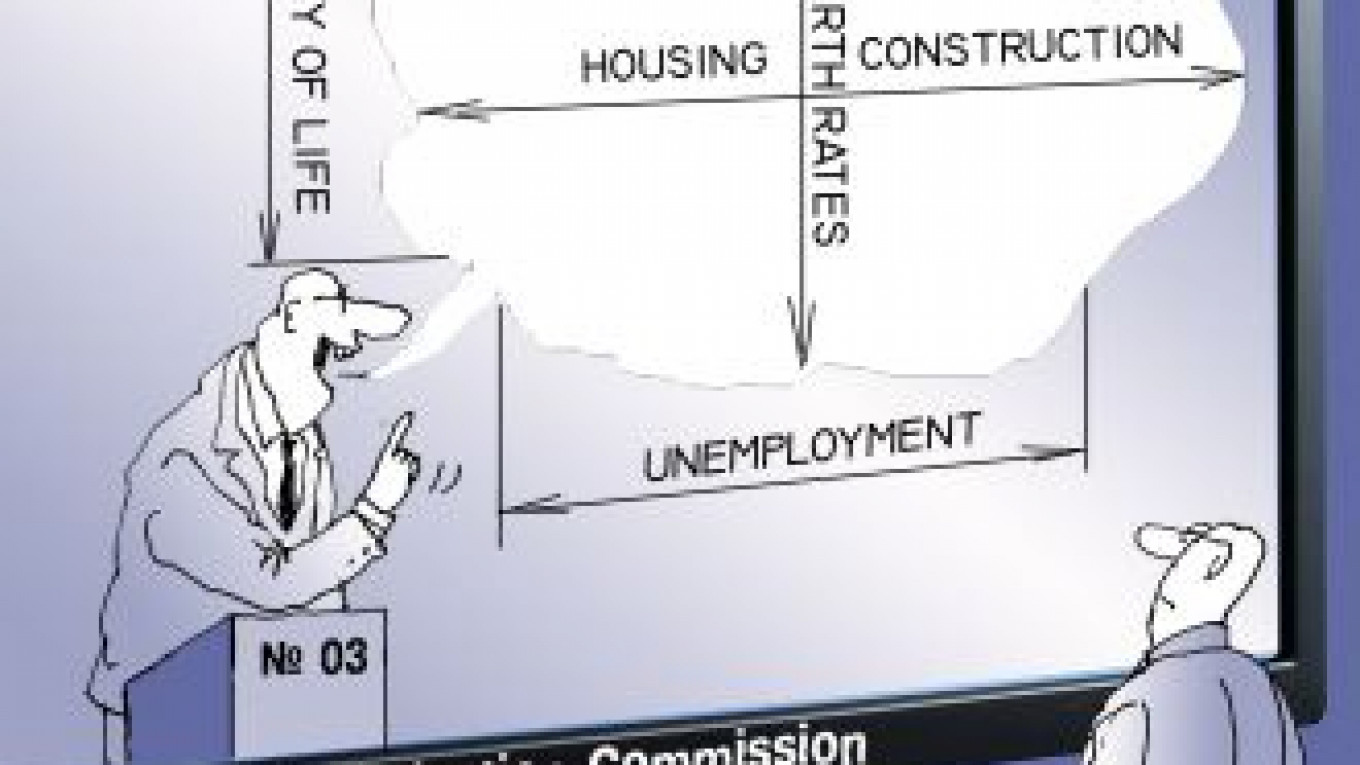As elections draw near, voters find themselves looking for some way to influence the results and manage their fate — yet can’t seem to find the televised debates, locate the name of the governor up for election on the ballot, or even be clear on the income and spending history of the candidates.
The flurry of party politics and populist promises leaves voters wondering who they can trust, and whether there is anyway to cut through the rhetoric and get some commitments.
This quandary brings to mind the old corporate adage, “You can’t manage what you don’t measure.”
What we need is a specific set of metrics that are recognized as being important to the country’s well-being and development. Possible measurements could be proposed in the Public Chamber, where they could be debated before being sent to the Cabinet, which could pass them to the Kremlin for ratification. After that, the metrics could be posted on the Internet — as was done for candidates for the Olympic mascot — for additional public debate and final selection.
The fundamental things to measure are easy: life expectancy, birth rates, unemployment and housing construction. But what about a few exotic ones designed to advance civilization and the quality of life?
- Kilometers of roads built and the average cost thereof, benchmarked to other countries: a good way to track infrastructure progress and corruption in one fell swoop.
- Number of hours the Yandex.Probki scale is at 5 points or more: a hard indicator of individual stress and the competence of municipal planners.
- Internet and PC penetration. Let’s face it, you’re not a global player if these are not going up rapidly.
- Small and midsized enterprises as a percent of GDP.
- Percent of children in orphanages as a part of the total: a clear indication of the health of the family.
Though there have been some grassroots efforts at rating governors, a more comprehensive and real-time platform would be needed to link existing and potential politicians to the abovementioned performance indicators.
The Central Election Commission, or one of the more respected political think tanks, could set up a secure web portal. Candidates registered for an upcoming election would be obligated to log in to their publicly available personal profile and indicate what performance numbers they can reach per each appropriate metric. A comments section would allow candidates to state how he would achieve those goals.
In line with President Dmitry Medvedev’s vision of Russia as a land of innovation, Russia would again leapfrog the rest of the world — as it did with mobile telephony — and escape from the murky swamp of photo ops and populist rhetoric into the light of a results-oriented, people-powered government.
A second section could list a number of key public issues and trends — separation of church and state, gay rights, more or less military spending, and so forth. Each candidate would indicate where he stands on these questions.
Then, it’s time for Ivan Ivanov to do his civic duty. Having logged into the portal. Using a web tool similar to the ones mobile operators have on their portals to help customers select the best tariff plan, Ivanov inputs his profile with the topics that are important to him and which stances on those topics he supports. Presto! Up pops a prioritized list of which candidates deserve his support. And the state could get a clear picture of public sentiment by analyzing the results.
Though it’s not easy to find truly independent democratic institutions in Russia, a rigorous and transparent process could be implemented to track the results. For example, after the elections, a panel of independent pundits could monitor the newly elected officials’ execution, both in terms of fulfillment of stated targets on the metrics — a standard corporate dashboard that gives a numerical rating and shows a red, yellow or green indicator depending on success. A check mark would indicate whether they are in compliance with their stated stance on an issue.
So by the time the next election rolls around, the electorate just has to log in and see whose been keeping their word, and who hasn’t.
Russia’s version of democracy does not copy the West’s — and perhaps it shouldn’t — but a little “if elected, I promise …” would go a long way to forcing some transparency and some results.
A Message from The Moscow Times:
Dear readers,
We are facing unprecedented challenges. Russia's Prosecutor General's Office has designated The Moscow Times as an "undesirable" organization, criminalizing our work and putting our staff at risk of prosecution. This follows our earlier unjust labeling as a "foreign agent."
These actions are direct attempts to silence independent journalism in Russia. The authorities claim our work "discredits the decisions of the Russian leadership." We see things differently: we strive to provide accurate, unbiased reporting on Russia.
We, the journalists of The Moscow Times, refuse to be silenced. But to continue our work, we need your help.
Your support, no matter how small, makes a world of difference. If you can, please support us monthly starting from just $2. It's quick to set up, and every contribution makes a significant impact.
By supporting The Moscow Times, you're defending open, independent journalism in the face of repression. Thank you for standing with us.
Remind me later.






